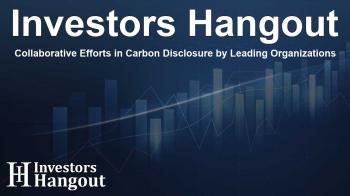Collaborative Efforts in Carbon Disclosure by Leading Organizations

Advancements in Carbon Disclosure Taxonomy
In recent times, sustainability has become a crucial focus for organizations worldwide, and for good reason. With climate change impacts being felt across the globe, companies are increasingly aware of their environmental responsibilities. Notably, the Open Compute Project Foundation is leading initiatives aimed at improving carbon disclosure practices. In collaboration with iMasons, they are developing a comprehensive taxonomy that can standardize carbon emissions reporting across the technology sector.
Understanding the Need for a Standardized Taxonomy
A standardized taxonomy for carbon disclosure is imperative due to the varying methods of reporting that currently exist. Organizations often use different metrics and benchmarks, making it challenging to compare carbon footprints accurately. The collaboration between the Open Compute Project Foundation and iMasons aims to create a unified framework that can enhance transparency and consistency in how carbon emissions are reported. This measure is pivotal in the collective fight against climate change.
Open Compute Project Foundation's Initiatives
The Open Compute Project Foundation (OCP) has been at the forefront of technology innovation since its inception. Its mission focuses on sharing knowledge and best practices for a sustainable digital infrastructure. With the rise of data centers and increasing energy demands, OCP's initiatives also encompass improvements in energy efficiency. Their recent partnership with iMasons signifies a commitment to not only improve technology offerings but also to ensure those offerings are environmentally responsible.
What iMasons Brings to the Table
Internet Infrastructure Masons (iMasons) is an influential organization dedicated to accelerating the adoption of sustainable practices in the digital infrastructure landscape. Their vast network of industry professionals and thought leaders adds significant value to the partnership with OCP. By blending their expertise in sustainability with OCP’s technological advancements, they aim to create an industry-wide standard for carbon disclosure that addresses both present needs and future challenges.
The Benefits of a Unified Approach
A unified carbon disclosure taxonomy will not only help organizations meet regulatory requirements but also empower them to take ownership of their environmental impact. Stakeholders from various sectors will benefit by having a common ground for evaluating and understanding carbon performance. This collaborative effort is anticipated to galvanize further action within the industry while promoting accountability and continuous improvement.
Engagement with Industry Leaders
The development of a cohesive taxonomy includes input from various industry leaders, making it a holistic approach to carbon accountability. Engaging with professionals from diverse sectors ensures that the taxonomy remains relevant and robust, accommodating a wide array of operational contexts. As more organizations engage with these reformative practices, the technology sector can expect to see a ripple effect. This collaboration might inspire more businesses to adopt transparent and eco-friendly practices.
Conclusion: A Step Towards a Sustainable Future
As the Open Compute Project Foundation and iMasons progress in developing a taxonomy for carbon disclosure, it represents an exciting leap towards a more sustainable approach to technology and business practices. Creating a common language for carbon reporting can help drive improvements in corporate responsibility while enhancing the general understanding of climate impact among consumers and businesses alike. This endeavor not only showcases the power of collaboration but also underscores a shared commitment to environmental stewardship in the technology industry.
Frequently Asked Questions
What is the purpose of the Open Compute Project Foundation's initiatives?
The Open Compute Project Foundation aims to promote innovative and sustainable technology solutions while enhancing carbon disclosure practices through collaboration with organizations like iMasons.
Why is a standardized carbon disclosure taxonomy important?
A standardized taxonomy is crucial for creating consistency and transparency in how organizations report carbon emissions, enabling better comparison and accountability.
How does iMasons contribute to carbon disclosure efforts?
iMasons brings expertise in sustainable practices and a network of industry professionals to support the development of a unified approach to carbon reporting.
What are the anticipated benefits of this collaborative effort?
This partnership is expected to empower organizations to better understand and manage their carbon footprints, leading to more responsible business practices.
How can companies ensure they are aligned with these new standards?
Organizations can engage in collaborative discussions, adopt the developed taxonomy, and continually refine their reporting methods to remain compliant with best practices.
About The Author
Contact Kelly Martin privately here. Or send an email with ATTN: Kelly Martin as the subject to contact@investorshangout.com.
About Investors Hangout
Investors Hangout is a leading online stock forum for financial discussion and learning, offering a wide range of free tools and resources. It draws in traders of all levels, who exchange market knowledge, investigate trading tactics, and keep an eye on industry developments in real time. Featuring financial articles, stock message boards, quotes, charts, company profiles, and live news updates. Through cooperative learning and a wealth of informational resources, it helps users from novices creating their first portfolios to experts honing their techniques. Join Investors Hangout today: https://investorshangout.com/
The content of this article is based on factual, publicly available information and does not represent legal, financial, or investment advice. Investors Hangout does not offer financial advice, and the author is not a licensed financial advisor. Consult a qualified advisor before making any financial or investment decisions based on this article. This article should not be considered advice to purchase, sell, or hold any securities or other investments. If any of the material provided here is inaccurate, please contact us for corrections.

